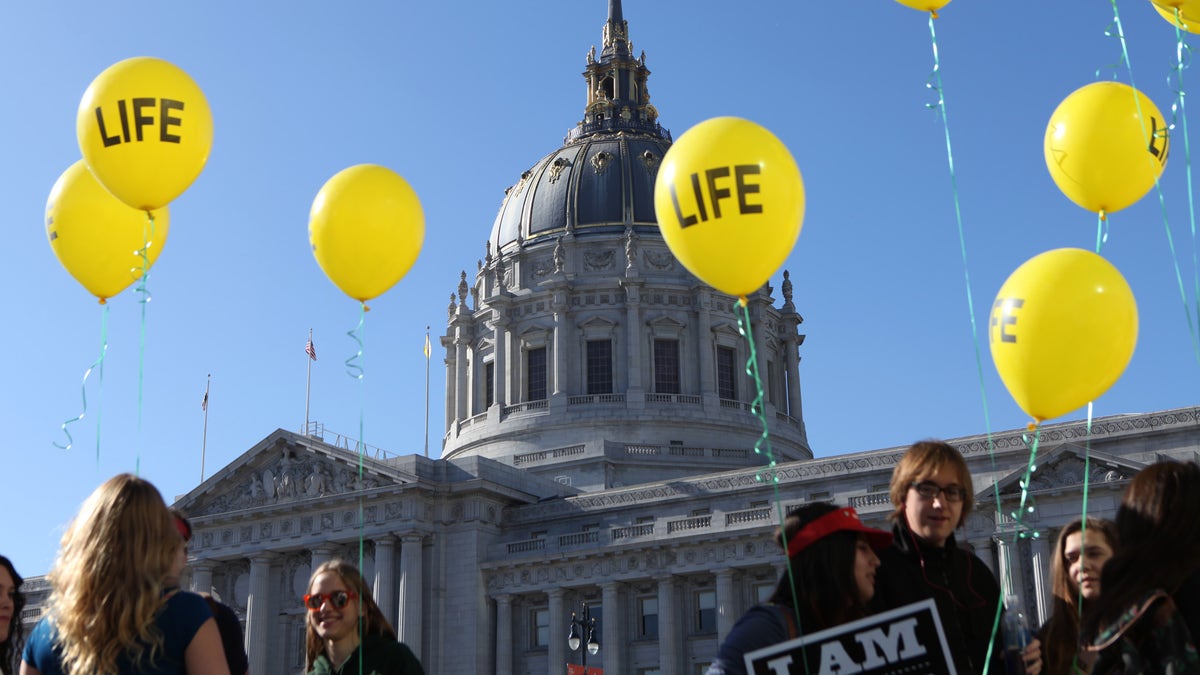
Members of the St. Rose of Lima Parish of Paso Robles Calif. arrive to the "Walk for Life" rally and march in San Francisco on Saturday, Jan. 24, 2015. Thousands of abortion opponents gathered at Civic Center Plaza in front of City Hall for the 11th annual event before marching down Market Street to Justin Herman Plaza. (AP Photo/Alex Washburn)
It has been a discouraging week for evangelical Christians and others who are steadfastly devoted to protecting unborn life.
Last Thursday, as I joined with approximately 100,000 others at the annual March for Life in Washington, D.C., the ostensibly pro-life Republican leadership of the House of Representatives called off a scheduled vote on the Pain-Capable Unborn Child Act. This legislation, which would prohibit abortions of unborn children past 20 weeks in their gestation in most cases, is a matter of conscience. Scientists believe that unborn children at 20 weeks are sufficiently developed so as to feel pain while abortion terminates their life. That’s why most Americans, both women and men—including many who support the right to choose an abortion earlier in a pregnancy—support this bill. But in an apparent betrayal of the many pro-life evangelical and Catholic voters who just helped their party to gain control of both chambers of Congress, Republican leaders in the House decided against even offering a vote on the legislation.
Christian engagement in public policy is driven by the fundamental biblical conviction that all human life is made in the image of God and is thus to be cherished. Regardless of gender, ethnicity, legal status, sexual orientation, religion, nationality, disability, or any other qualifier, human life is sacred, and our faith requires us to advocate in particular for those who cannot speak up for themselves. Children still within their mothers’ wombs certainly meet that definition.
That’s why Christians—including the vast majority of Latino evangelicals represented by the tens of thousands of local churches within our nation who form the National Hispanic Christian Leadership Conference—are so adamantly pro-life. In fact, a recent poll finds that Hispanic immigrant evangelicals are among the most pro-life constituency in the nation: fully 73% oppose abortion in all or most cases, compared to 43% of the general population and 65% of our white evangelical brethren.
Latino evangelicals feel betrayed by the House Republicans’ failure to vote on this basic legislation. Unfortunately, such betrayal seems to be becoming a trend.
Just two weeks ago, after assuring evangelical leaders both privately and publicly for more than a year that they were committed to finally reforming our antiquated immigration laws as we have urged them to do, House Republicans leadership pushed forward a bill to end the Deferred Action for Childhood Arrivals (DACA) program, which since 2012 has allowed certain individuals who were brought into the U.S. as children, not of their own volition, to be granted temporary work authorization and be relieved of the fear of deportation. That administrative policy has meant hope for tens of thousands of ambitious young people within Hispanic evangelical churches. The House’s effort to remove these young people’s work authorization and put them at risk of deportation is an offense to most Latino evangelicals (and to many other evangelical Christians as well).
It also should be deeply troublesome to all who support the pro-life cause, because the vote to end DACA—and the failure to advance the commons sense immigration reforms that are popular with most Americans as well as most evangelical Christians—is political suicide, setting up a scenario where it becomes nearly impossible for a pro-life president to be elected in 2016.
That’s because it is nearly impossible for a pro-life Republican presidential candidate to win the Electoral College without improving their standing among Latino voters from the paltry 27% that Governor Romney received in 2012, after vowing to dismantle the DACA program if elected and endorsing an immigration policy of “self-deportation.” Latinos—and particularly Latino evangelicals—are eager to vote for a pro-life, pro-immigrant candidate in 2016, but the GOP’s recent actions in the House of Representatives convey to Latino voters that it is uninterested in either label.
It’s not too late though. Congressional Republicans should quickly take up both the Pain-Capable Unborn Child Act and a series of immigration bills that would secure our borders, reform our dysfunctional visa system, and establish a process by which immigrants present unlawfully could earn permanent legal status and eventual citizenship if they’re willing to pay a fine, pass a criminal background check, and work over the course of several years for those privileges.
If they fail to do so, Latino evangelicals, for whom the pro-life cause and immigration reform are two key policy concerns, will take note. As was the case in 2012, whena majority supported President Obama’s re-election, most will likely vote for Democratic candidates whom they trust will act on at least one of their key priorities.








































